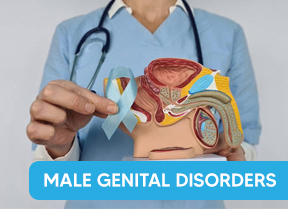
Services
Home / Services
Male Fertility Services
Male infertility is a common yet often overlooked issue, contributing to nearly 40-50% of infertility cases worldwide. It occurs when a man has difficulty in fertilizing an egg due to low sperm count, poor sperm motility, or underlying medical conditions.
At A4 Male Fertility Clinic, we specialize in diagnosing and treating male fertility issues using advanced medical techniques and personalized care.
If you and your partner have been trying to conceive without success, our team of fertility experts is here to help you explore the best solutions tailored to your needs.

Male Fertility Specialists
Cutting-Edge Lab & Tech
Proven Success Rate
Personalized Treatment
Common Causes of Male Infertility
Medical & Genetic Causes
✔ Low Sperm Count (Oligospermia) – Fewer sperm than normal in the semen.
✔ Poor Sperm Motility (Asthenozoospermia) – Sperm cannot swim effectively to fertilize the egg.
✔ Abnormal Sperm Shape (Teratozoospermia) – Irregular sperm shapes reduce the chances of fertilization.
✔ Hormonal Imbalances – Low testosterone or imbalanced hormones affecting sperm production.
✔ Varicocele (Enlarged Veins in the Scrotum) – Causes overheating of the testicles, reducing sperm quality.
✔ Genetic Conditions – Disorders like Klinefelter Syndrome or Y-chromosome microdeletions.
Lifestyle & Environmental Causes
✔ Smoking & Alcohol Consumption – Lowers sperm quality and reduces fertility.
✔ Obesity, Poor Diet & Nutrition – Affects hormone levels and sperm production.
✔ Stress & Lack of Sleep – Increases cortisol levels, impacting testosterone production.
✔ Excessive Heat Exposure – Frequent use of hot tubs, saunas, or tight clothing can reduce sperm count.
✔ Exposure to Toxins – Pesticides, heavy metals, and radiation can damage sperm cells.
✔ Sedentary Lifestyle – Lack of physical activity can lead to poor circulation and lower testosterone levels, affecting sperm health.
Our Services

Male Fertility

Male Sexual Health

Male Genital Disorders

Marital Health Checks
Step-by-Step Process for Male Fertility Treatment
Step-1 : Understanding Your Concerns
✔ Listen to your concerns and medical history.
✔ Ask about your lifestyle, diet, stress levels, and past treatments.
✔ Explain the possible reasons for fertility issues in simple terms.
Step-2 : Physical Examination & Basic Tests
✔ The doctor will perform a gentle examination of your testicles to check for any issues.
✔ We will check for conditions like varicocele (swollen veins in the testicles), hormonal imbalances, or blockages.
Step-3 : Fertility Testing – Finding the Cause
✔ Semen Analysis – Sperm Count, Motility, Morphology
✔ Hormone Tests – To check testosterone and other fertility-related hormones.
✔ Scrotal Ultrasound – A painless scan to check for varicocele or other issues.
✔ Genetic & DNA Tests (if needed) – If there are no sperm in semen, further testing is done.
Step-4 : Personalized Treatment Plan
✔ Clearly explain the findings to you.
✔ Suggest simple lifestyle changes or medications if needed.
✔ Recommend the best treatment options based on your condition.
- We create a comfortable, private, and supportive environment for discussing your concerns.
Step-5 : Treatment Options for Male Fertility
✔ Lifestyle & Natural Improvements
✔ Medications & Hormone Therapy.
✔ Assisted Reproductive Techniques
✔ Surgical Treatments.
Step-6 : Follow-Up & Monitoring
✔ Regular check-ups to track improvements and adjust treatment if needed.
✔ Repeat semen analysis to check progress.
✔ Emotional and psychological support is available for stress-free treatment.
Frequently Asked Questions

1. What are the common causes of male infertility?
Male infertility can be caused by medical conditions like low sperm count, poor sperm motility, hormonal imbalances, varicocele (enlarged veins in the scrotum), and genetic disorders. Lifestyle factors such as smoking, alcohol consumption, obesity, stress, and exposure to toxins can also affect fertility.
2. Can male infertility be treated?
Yes, treatment options depend on the cause. Lifestyle changes, medications, hormonal therapy, surgical procedures (like varicocele repair), and assisted reproductive technologies (like IVF or ICSI) can help improve fertility.
3. How can I improve my sperm health naturally?
Maintaining a healthy weight, eating a balanced diet rich in antioxidants, exercising regularly, managing stress, avoiding smoking and alcohol, and minimizing exposure to heat and toxins can all help improve sperm quality.
4. Does age affect male fertility?
While men can produce sperm throughout life, sperm quality may decline with age. After 40, there may be a higher risk of genetic abnormalities and reduced fertility potential.
5. When should I see a doctor about infertility?
If you and your partner have been trying to conceive for over a year (or six months if the female partner is over 35) without success, it’s recommended to see a doctor for a fertility evaluation.